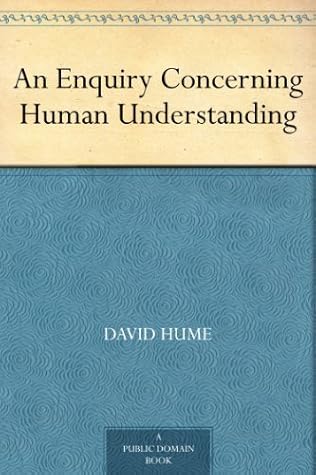More on this book
Community
Kindle Notes & Highlights
Moral philosophy, or the science of human nature, may be treated after two different manners; each of which has its peculiar merit, and may contribute to the entertainment, instruction, and reformation of mankind. The one considers man chiefly as born for action; and as influenced in his measures by taste and sentiment; pursuing one object, and avoiding another, according to the value which these objects seem to possess, and according to the light in which they present themselves. As virtue, of all objects, is allowed to be the most valuable, this species of philosophers paint her in the most
...more
The other species of philosophers consider man in the light of a reasonable rather than an active being, and endeavour to form his understanding more than cultivate his manners. They regard human nature as a subject of speculation; and with a narrow scrutiny examine it, in order to find those principles, which regulate our understanding, excite our sentiments, and make us approve or blame any particular object, action, or behaviour. They think it a reproach to all literature, that philosophy should not yet have fixed, beyond controversy, the foundation of morals, reasoning, and criticism; and
...more
But a philosopher, who purposes only to represent the common sense of mankind in more beautiful and more engaging colours, if by accident he falls into error, goes no farther; but renewing his appeal to common sense, and the natural sentiments of the mind, returns into the right path, and secures himself from any dangerous illusions. The fame of Cicero flourishes at present; but that of Aristotle is utterly decayed. La Bruyere passes the seas, and still maintains his reputation: But the glory of Malebranche is confined to his own nation, and to his own age. And Addison, perhaps, will be read
...more
Nothing is more useful than for writers, even, on moral, political, or physical subjects, to distinguish between reason and experience, and to suppose, that these species of argumentation are entirely different from each other. The former are taken for the mere result of our intellectual faculties, which, by considering priori the nature of things, and examining the effects, that must follow from their operation, establish particular principles of science and philosophy. The latter are supposed to be derived entirely from sense and observation, by which we learn what has actually resulted from
...more
The same distinction between reason and experience is maintained in all our deliberations concerning the conduct of life; while the experienced statesman, general, physician, or merchant is trusted and followed; and the unpractised novice, with whatever natural talents endowed, neglected and despised. Though it be allowed, that reason may form very plausible conjectures with regard to the consequences of such a particular conduct in such particular circumstances; it is still supposed imperfect, without the assistance of experience, which is alone able to give stability and certainty to the
...more
But the observation of any fraud or cruelty in private life is sufficient, with the aid of a little thought, to give us the same apprehension; while it serves as an instance of the general corruption of human nature, and shows us the danger which we must incur by reposing an entire confidence in mankind. In both cases, it is experience which is ultimately the foundation of our inference and conclusion.
Mr. Locke, in his chapter of power, says that, finding from experience, that there are several new productions in nature, and concluding that there must somewhere be a power capable of producing them, we arrive at last by this reasoning at the idea of power. But no reasoning can ever give us a new, original, simple idea; as this philosopher himself confesses. This, therefore, can never be the origin of that idea.
It seems to me not impossible to avoid these absurdities and contradictions, if it be admitted, that there is no such thing as abstract or general ideas, properly speaking; but that all general ideas are, in reality, particular ones, attached to a general term, which recalls, upon occasion, other particular ones, that resemble, in certain circumstances, the idea, present to the mind. Thus when the term Horse is pronounced, we immediately figure to ourselves the idea of a black or a white animal, of a particular size or figure: But as that term is also usually applied to animals of other
...more
That impious maxim of the ancient philosophy, Ex nihilo, nihil fit, by which the creation of matter was excluded, ceases to be a maxim, according to this philosophy. Not only the will of the supreme Being may create matter; but, for aught we know a priori, the will of any other being might create it, or any other cause, that the most whimsical imagination can assign.


